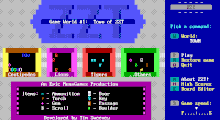| ZZT | |
|---|---|
 Title screen of Town of ZZT | |
| Developer(s) | Potomac Computer Systems |
| Publisher(s) | Potomac Computer Systems |
| Designer(s) | Tim Sweeney |
| Platform(s) | MS-DOS |
| Release |
|
| Genre(s) | Action-adventure, game creation system, puzzle |
| Mode(s) | Single-player |
ZZT is a 1991 action-adventure puzzle video game and game creation system developed and published by Potomac Computer Systems for MS-DOS. It was later released as freeware in 1997. It is an early game allowing user-generated content using object-oriented programming. Players control a smiley face to battle various creatures and solve puzzles in different grid-based boards in a chosen world. It has four worlds where players explore different boards and interact with objects such as ammo, bombs, and scrolls to reach the end of the game. It includes an in-game editor, allowing players to develop worlds using the game's scripting language, ZZT-OOP.
The game was designed by mechanical engineering student Tim Sweeney in roughly six to nine months. It was built from a text editor conceived in 1989 to build a better editor for Pascal, after he disliked editors that came with other programming languages. During development, he experimented with adding creatures and characters. He built boards that grew into worlds and refined the editor he used to create his own games—while studying at university. Initially, he made the game for himself, but after positive reception from his friends and neighbors, and seeing the potential for making a profit by releasing the game under shareware, he released it publicly. He marketed the game by distributing it across shareware vendors and bulletin board systems, earning money through mail orders for registered worlds.
ZZT was a commercial success, with around 4,000–5,000 copies by 2009. The game received mixed reception. Much of the positive reception focused on the gameplay, editor, and the community it developed. Criticisms focused on the game's graphical and audio limitations and perceived unfair difficulty. The sequel is Super ZZT (1991). Other ZZT worlds were published later as Best of ZZT (1992) and ZZT's Revenge (1992). ZZT's success led Sweeney to change his company's name to Epic MegaGames, and focus on competing as a video game company using shareware to distribute commercial games. Epic MegaGames later developed other successful games including Jill of the Jungle (1992) and Unreal (1998), using lessons from ZZT's success by focusing on developing the editor and engine to allow others to more easily make games. The game inspired one of the earliest active modding communities, which has grown by making new worlds, editing tools, and source ports, and inspiring some in the community to pursue a career in the video game industry.